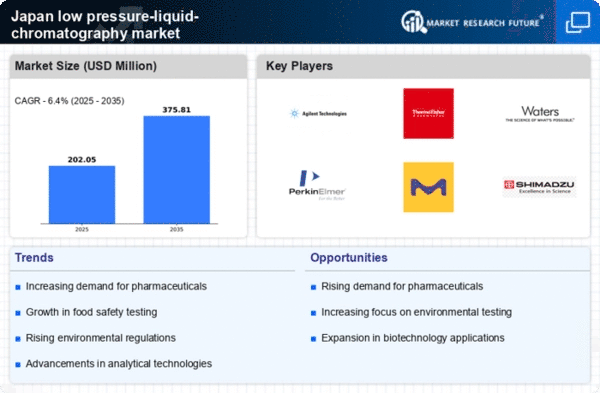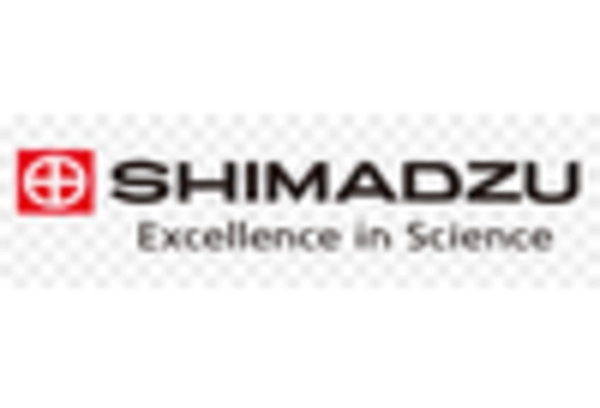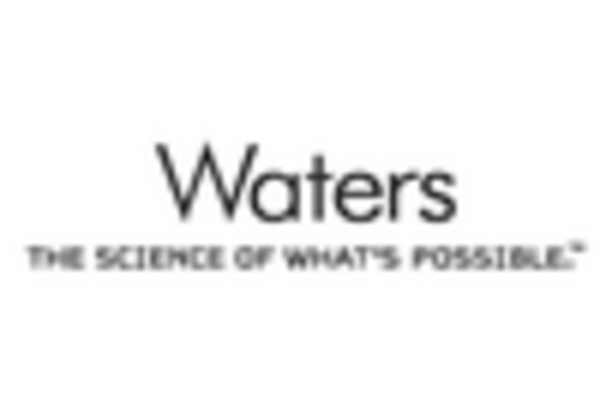Growing Environmental Regulations
Japan's commitment to environmental sustainability is driving the low pressure-liquid-chromatography market as industries adapt to stricter environmental regulations. The government is implementing policies aimed at reducing chemical waste and promoting greener practices, which necessitate the use of efficient separation techniques. Low pressure-liquid chromatography offers a viable solution for minimizing solvent usage and enhancing the recovery of valuable compounds. As companies strive to comply with these regulations, the market for low pressure-liquid chromatography is expected to expand, with an estimated growth rate of 5% over the next few years. This shift towards environmentally friendly practices is likely to reshape the competitive landscape of the low pressure-liquid-chromatography market.
Increased Focus on Quality Control
Quality control remains a critical aspect of manufacturing processes across various industries in Japan, particularly in food and beverage, cosmetics, and pharmaceuticals. The low pressure-liquid-chromatography market is benefiting from this heightened focus, as companies seek reliable methods for analyzing product purity and composition. Regulatory bodies in Japan are enforcing stricter quality standards, compelling manufacturers to adopt advanced analytical techniques. The market for quality control solutions is projected to grow by approximately 6% annually, with low pressure-liquid chromatography emerging as a preferred choice due to its efficiency and accuracy. This trend underscores the importance of maintaining high-quality standards in the low pressure-liquid-chromatography market.
Expansion of Biotechnology Research
The low pressure-liquid-chromatography market is significantly influenced by the expansion of biotechnology research in Japan. As the country invests heavily in biopharmaceuticals and genetic research, the demand for advanced analytical techniques is on the rise. Low pressure-liquid chromatography is increasingly utilized for the purification of biomolecules, including proteins and nucleic acids, which are crucial for various biotechnological applications. The Japanese biotechnology sector is expected to grow at a CAGR of around 8% over the next five years, indicating a robust market for low pressure-liquid chromatography solutions. This growth is likely to be fueled by collaborations between academic institutions and industry players, further enhancing the market landscape.
Rising Demand for Pharmaceutical Applications
The low pressure-liquid-chromatography market in Japan is experiencing a notable surge in demand, particularly within the pharmaceutical sector. This growth is driven by the increasing need for efficient separation and purification processes in drug development and production. As pharmaceutical companies strive to meet stringent regulatory requirements, the adoption of low pressure-liquid chromatography techniques is becoming essential. In 2025, the pharmaceutical industry in Japan is projected to reach a market value of approximately $50 billion, with chromatography playing a pivotal role in ensuring product quality and safety. The emphasis on high-throughput screening and the need for rapid analysis further bolster the relevance of low pressure-liquid chromatography in this sector.
Technological Integration in Laboratory Settings
The integration of advanced technologies in laboratory settings is reshaping the low pressure-liquid-chromatography market in Japan. Automation and digitalization are becoming increasingly prevalent, enhancing the efficiency and accuracy of chromatographic processes. Laboratories are adopting sophisticated software and hardware solutions to streamline workflows and improve data management. This trend is expected to drive the market forward, as organizations seek to optimize their operations and reduce human error. The market for laboratory automation is projected to grow by 7% annually, indicating a strong potential for low pressure-liquid-chromatography systems that can seamlessly integrate with these technologies. This evolution reflects a broader shift towards modernization in the low pressure-liquid-chromatography market.
















